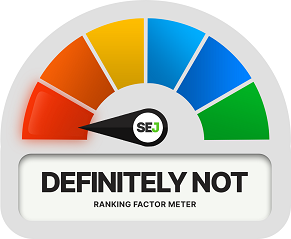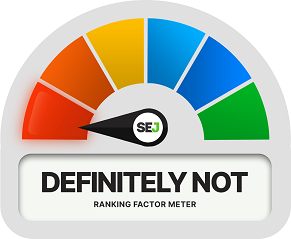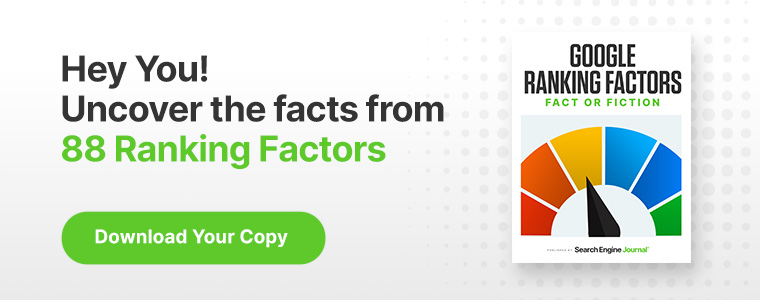Google AdSense: Is It a Google Search Ranking Factor?

AdSense is a Google ad product that allows publishers to monetize their content by displaying targeted advertisements on their website. Publishers earn money when people view or click on these ads.
So why do some people believe AdSense is a ranking factor? Ads have nothing to do with organic ranking, right?
Well, the belief is that sending traffic to pages with ads served by Google also serves Google’s interests as a company.
When a website is monetized with AdSense, it becomes another platform for Google’s advertisers to serve ads on.
Ethics aside, there’s an incentive for Google to send traffic to pages displaying AdSense ads.
More traffic means more ad clicks and views, which means Google’s advertisers are happy to pay for more ads.
But would Google let its interests as a company get in the way of delivering unbiased organic search results?
That’s the theory shared amongst those who question whether AdSense is a ranking factor.
Conversely, there are concerns AdSense ads could impact rankings in a negative way, as Google has specific guidelines on proper ad placement.
Let’s dive further into these claims, then look at what the evidence says about the impact of AdSense on search rankings.
The Claim: AdSense is a Ranking Factor
There are various claims related to AdSense as a ranking factor.
AdSense is a Positive Signal
One theory suggests that putting AdSense ads on a page has a positive effect on rankings because those ads generate profit for Google and its advertisers.
With Google having many of its services intertwined – such as organic search, Google Ads, and AdSense – there’s bound to be speculation that they share signals between each other.
Just as theories circulate about Google Ads being a ranking factor, which we debunk in another chapter, the same line of thinking gets applied to AdSense.
Lack of trust in Google?
An element connecting all these theories appears to be a distrust for Google.
People believe these claims because there isn’t enough trust in Google to keep search results fair and objective.
Google’s reputation as a trustworthy company has been damaged by lawsuits and investigations into alleged anticompetitive business practices.
Government officials have accused Google of such things as favoring its own apps on Android, and favoring its own products in search results.
Antitrust charges have been filed against Google in Europe and the United States in the past. Google is often under the microscope of the U.S. Department of Justice for claims related to anti-competitive behavior.
Despite being ordered to pay fines, Google maintains it didn’t do anything to stifle competition.
Continued investigations into Google’s practices do significant damage to its image of being a company people can trust.
That’s why AdSense continues to come up in discussions about ranking factors.
AdSense is a Negative Signal
Another claim suggests site owners have to tread lightly when participating in AdSense.
Using too many ads, or using them in the wrong places, is thought to negatively impact rankings.
This theory stems from the fact that Google is gradually putting more emphasis on pages that offer a good user experience.
Crowding a page with ads creates a poor user experience in a number of ways that Google considers important.
An abundance of ads can make the main content difficult to identify, cause the page to load slower, and cause the page to move around as it’s loading.
Each of these could lower a site’s page experience score. That’s why AdSense may come up as a negative ranking factor.
According to claims, AdSense either boosts rankings or lowers them. Which one is it?
Here’s the evidence.
The Evidence: AdSense As A Ranking Factor
This section is separated into two parts for each of the adjacent claims.
AdSense is a Positive Signal
The question of whether AdSense affects a site’s search rankings comes up so often that Google addresses it in the official AdSense Help guide.
Google confirms that AdSense does not impact a site’s position in the SERPs:
“Participating in Google AdSense does not affect your site’s rank in Google search results and will not affect the search results we deliver.
Google believes strongly in freedom of expression and therefore offers broad access to content across the web.
Our search results are unbiased by our relationships with paying advertisers and publishers. We will continue to show search results according to our PageRank technology.”
Site owners shouldn’t use AdSense under the assumption it will have a positive impact on search rankings, as that’s confirmed to be untrue.
It’s worth keeping this in mind if you’re doing a competitive SERP analysis. If a competitor is using AdSense and your site is not, you don’t have to worry about it being a factor that will contribute to better rankings.
Will it lead to worse rankings? Here’s the evidence on the other claim.
AdSense is a Negative Ranking Factor
As we learned in the above section, AdSense doesn’t impact rankings either positively or negatively.
Advertisements in general can, however, degrade the user experience in Google’s eyes and lead to lower rankings.
There’s nothing inherently wrong with putting ads on a website. But the ways in which they’re used can cause trouble for SEO.
When it comes to ad placement, Google asks site owners to follow the Better Ads Standards which list unacceptable placements of ads on mobile and desktop.
In addition, the AdSense Help Center has a section on best practices for ad placement, which site owners are asked to follow.
Lastly, Google’s page experience update takes into consideration how a site uses ads.
In communication to site owners regarding the page experience update, Google says:
“A site must not use advertising techniques that are distracting, interrupting, or otherwise not conducive to a good user experience.”
There are various ways sites can use ads that negatively impact rankings, but that isn’t exclusive to AdSense.
To that end, Google has gone on record saying AdSense is not exempt from the negative signals that ads could potentially generate.
Invasive AdSense ads are treated the same as any other type of invasive ad.
Google AdSense as a Ranking Factor: Our Verdict

Google confirms that AdSense is not a ranking factor.
The way AdSense ads are used on a page could lead to lower rankings, but that’s true of all ads. Therefore it’s not accurate to say AdSense is a potential negative ranking factor, either.
Featured image: Paolo Bobita/Search Engine Journal
AI
Exploring the Evolution of Language Translation: A Comparative Analysis of AI Chatbots and Google Translate

According to an article on PCMag, while Google Translate makes translating sentences into over 100 languages easy, regular users acknowledge that there’s still room for improvement.
In theory, large language models (LLMs) such as ChatGPT are expected to bring about a new era in language translation. These models consume vast amounts of text-based training data and real-time feedback from users worldwide, enabling them to quickly learn to generate coherent, human-like sentences in a wide range of languages.
However, despite the anticipation that ChatGPT would revolutionize translation, previous experiences have shown that such expectations are often inaccurate, posing challenges for translation accuracy. To put these claims to the test, PCMag conducted a blind test, asking fluent speakers of eight non-English languages to evaluate the translation results from various AI services.
The test compared ChatGPT (both the free and paid versions) to Google Translate, as well as to other competing chatbots such as Microsoft Copilot and Google Gemini. The evaluation involved comparing the translation quality for two test paragraphs across different languages, including Polish, French, Korean, Spanish, Arabic, Tagalog, and Amharic.
In the first test conducted in June 2023, participants consistently favored AI chatbots over Google Translate. ChatGPT, Google Bard (now Gemini), and Microsoft Bing outperformed Google Translate, with ChatGPT receiving the highest praise. ChatGPT demonstrated superior performance in converting colloquialisms, while Google Translate often provided literal translations that lacked cultural nuance.
For instance, ChatGPT accurately translated colloquial expressions like “blow off steam,” whereas Google Translate produced more literal translations that failed to resonate across cultures. Participants appreciated ChatGPT’s ability to maintain consistent levels of formality and its consideration of gender options in translations.
The success of AI chatbots like ChatGPT can be attributed to reinforcement learning with human feedback (RLHF), which allows these models to learn from human preferences and produce culturally appropriate translations, particularly for non-native speakers. However, it’s essential to note that while AI chatbots outperformed Google Translate, they still had limitations and occasional inaccuracies.
In a subsequent test, PCMag evaluated different versions of ChatGPT, including the free and paid versions, as well as language-specific AI agents from OpenAI’s GPTStore. The paid version of ChatGPT, known as ChatGPT Plus, consistently delivered the best translations across various languages. However, Google Translate also showed improvement, performing surprisingly well compared to previous tests.
Overall, while ChatGPT Plus emerged as the preferred choice for translation, Google Translate demonstrated notable improvement, challenging the notion that AI chatbots are always superior to traditional translation tools.
Source: https://www.pcmag.com/articles/google-translate-vs-chatgpt-which-is-the-best-language-translator
Google Implements Stricter Guidelines for Mass Email Senders to Gmail Users

Beginning in April, Gmail senders bombarding users with unwanted mass emails will encounter a surge in message rejections unless they comply with the freshly minted Gmail email sender protocols, Google cautions.
Fresh Guidelines for Dispatching Mass Emails to Gmail Inboxes In an elucidative piece featured on Forbes, it was highlighted that novel regulations are being ushered in to shield Gmail users from the deluge of unsolicited mass emails. Initially, there were reports surfacing about certain marketers receiving error notifications pertaining to messages dispatched to Gmail accounts. Nonetheless, a Google representative clarified that these specific errors, denoted as 550-5.7.56, weren’t novel but rather stemmed from existing authentication prerequisites.
Moreover, Google has verified that commencing from April, they will initiate “the rejection of a portion of non-compliant email traffic, progressively escalating the rejection rate over time.” Google elaborates that, for instance, if 75% of the traffic adheres to the new email sender authentication criteria, then a portion of the remaining non-conforming 25% will face rejection. The exact proportion remains undisclosed. Google does assert that the implementation of the new regulations will be executed in a “step-by-step fashion.”
This cautious and methodical strategy seems to have already kicked off, with transient errors affecting a “fraction of their non-compliant email traffic” coming into play this month. Additionally, Google stipulates that bulk senders will be granted until June 1 to integrate “one-click unsubscribe” in all commercial or promotional correspondence.
Exclusively Personal Gmail Accounts Subject to Rejection These alterations exclusively affect bulk emails dispatched to personal Gmail accounts. Entities sending out mass emails, specifically those transmitting a minimum of 5,000 messages daily to Gmail accounts, will be mandated to authenticate outgoing emails and “refrain from dispatching unsolicited emails.” The 5,000 message threshold is tabulated based on emails transmitted from the same principal domain, irrespective of the employment of subdomains. Once the threshold is met, the domain is categorized as a permanent bulk sender.
These guidelines do not extend to communications directed at Google Workspace accounts, although all senders, including those utilizing Google Workspace, are required to adhere to the updated criteria.
Augmented Security and Enhanced Oversight for Gmail Users A Google spokesperson emphasized that these requisites are being rolled out to “fortify sender-side security and augment user control over inbox contents even further.” For the recipient, this translates to heightened trust in the authenticity of the email sender, thus mitigating the risk of falling prey to phishing attempts, a tactic frequently exploited by malevolent entities capitalizing on authentication vulnerabilities. “If anything,” the spokesperson concludes, “meeting these stipulations should facilitate senders in reaching their intended recipients more efficiently, with reduced risks of spoofing and hijacking by malicious actors.”
Google’s Next-Gen AI Chatbot, Gemini, Faces Delays: What to Expect When It Finally Launches

In an unexpected turn of events, Google has chosen to postpone the much-anticipated debut of its revolutionary generative AI model, Gemini. Initially poised to make waves this week, the unveiling has now been rescheduled for early next year, specifically in January.
Gemini is set to redefine the landscape of conversational AI, representing Google’s most potent endeavor in this domain to date. Positioned as a multimodal AI chatbot, Gemini boasts the capability to process diverse data types. This includes a unique proficiency in comprehending and generating text, images, and various content formats, even going so far as to create an entire website based on a combination of sketches and written descriptions.
Originally, Google had planned an elaborate series of launch events spanning California, New York, and Washington. Regrettably, these events have been canceled due to concerns about Gemini’s responsiveness to non-English prompts. According to anonymous sources cited by The Information, Google’s Chief Executive, Sundar Pichai, personally decided to postpone the launch, acknowledging the importance of global support as a key feature of Gemini’s capabilities.
Gemini is expected to surpass the renowned ChatGPT, powered by OpenAI’s GPT-4 model, and preliminary private tests have shown promising results. Fueled by significantly enhanced computing power, Gemini has outperformed GPT-4, particularly in FLOPS (Floating Point Operations Per Second), owing to its access to a multitude of high-end AI accelerators through the Google Cloud platform.
SemiAnalysis, a research firm affiliated with Substack Inc., expressed in an August blog post that Gemini appears poised to “blow OpenAI’s model out of the water.” The extensive compute power at Google’s disposal has evidently contributed to Gemini’s superior performance.
Google’s Vice President and Manager of Bard and Google Assistant, Sissie Hsiao, offered insights into Gemini’s capabilities, citing examples like generating novel images in response to specific requests, such as illustrating the steps to ice a three-layer cake.
While Google’s current generative AI offering, Bard, has showcased noteworthy accomplishments, it has struggled to achieve the same level of consumer awareness as ChatGPT. Gemini, with its unparalleled capabilities, is expected to be a game-changer, demonstrating impressive multimodal functionalities never seen before.
During the initial announcement at Google’s I/O developer conference in May, the company emphasized Gemini’s multimodal prowess and its developer-friendly nature. An application programming interface (API) is under development, allowing developers to seamlessly integrate Gemini into third-party applications.
As the world awaits the delayed unveiling of Gemini, the stakes are high, with Google aiming to revolutionize the AI landscape and solidify its position as a leader in generative artificial intelligence. The postponed launch only adds to the anticipation surrounding Gemini’s eventual debut in the coming year.
-

 PPC7 days ago
PPC7 days ago19 Best SEO Tools in 2024 (For Every Use Case)
-
SEARCHENGINES6 days ago
Daily Search Forum Recap: April 19, 2024
-

 WORDPRESS7 days ago
WORDPRESS7 days agoHow to Make $5000 of Passive Income Every Month in WordPress
-

 WORDPRESS5 days ago
WORDPRESS5 days ago13 Best HubSpot Alternatives for 2024 (Free + Paid)
-

 MARKETING6 days ago
MARKETING6 days agoBattling for Attention in the 2024 Election Year Media Frenzy
-

 SEO7 days ago
SEO7 days ago25 WordPress Alternatives Best For SEO
-

 WORDPRESS6 days ago
WORDPRESS6 days ago7 Best WooCommerce Points and Rewards Plugins (Free & Paid)
-

 AFFILIATE MARKETING7 days ago
AFFILIATE MARKETING7 days agoAI Will Transform the Workplace. Here’s How HR Can Prepare for It.

















You must be logged in to post a comment Login